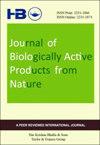难消化糊精对肥胖小鼠肠道吸收α-亚麻酸的作用比亚油酸更明显
IF 1
Q4 CHEMISTRY, MEDICINAL
Journal of Biologically Active Products from Nature
Pub Date : 2023-07-04
DOI:10.1080/22311866.2023.2256309
引用次数: 0
摘要
摘要 亚油酸(LA)和α-亚麻酸(ALA)是主要的膳食多不饱和脂肪酸。难以消化的糊精(DEX)是一种膳食纤维,可降低与生活方式相关的疾病风险因素。我们研究了 DEX 对肥胖小鼠肠道吸收 LA 和 ALA 的影响。在不添加或添加 0.06 w/v% DEX 的情况下,给 KK-Ay/TaJcl 肥胖小鼠喂食富含 ALA 或 LA 的食物并提供水,连续喂食 4 周。对血清样本中的脂质水平以及血清和肝脏中的脂肪酶活性进行了分析。利用喂养状态模拟肠液(FeSSIF)溶液中的肠道吸收过程体外模型,研究了DEX对LA和ALA肠道吸收的影响。ALA导致的血清甘油三酯(TG)水平的升高高于饲喂富含LA膳食时观察到的水平。DEX 能明显抑制 ALA 导致的血清甘油三酯(TG)水平升高。LA和ALA均不影响血清总胆固醇和高密度脂蛋白胆固醇水平,也不影响血清和肝脏脂肪酶活性。此外,在 FeSSIF 溶液中,ALA 的溶解度优于 LA。DEX显著抑制了ALA在FeSSIF溶液中的溶解度,而LA的溶解度不受DEX的影响。在肠道吸收过程中,ALA比LA更容易被吸收,这可能会导致血清TG水平的升高,然后DEX会比LA更有选择性地抑制ALA的肠道吸收。图表摘要本文章由计算机程序翻译,如有差异,请以英文原文为准。
Indigestible Dextrin Alleviates the Intestinal Absorption of Alpha-linolenic Acid More Markedly Than That of Linoleic Acid in Obese Mice
Abstract Linoleic acid (LA) and alpha-linolenic acid (ALA) constitute the main dietary polyunsaturated fatty acids. Indigestible dextrin (DEX) is a dietary fiber that causes a beneficial decrease in lifestyle-related disease risk factors. We investigated the effects of DEX on intestinal absorption of LA and ALA in obese mice. KK-Ay/TaJcl obese mice were fed an ALA- or LA-abundant diet and provided with water in the absence and presence of 0.06 w/v% DEX for 4 weeks. The levels of lipids in serum samples and the lipase activity in serum and liver were analyzed. The effects of DEX on the intestinal absorption of LA and ALA were investigated using an in vitro model of the intestinal absorption process in the fed-state simulated intestinal fluid (FeSSIF) solution. ALA resulted in an increase in the serum triglyceride (TG) levels than those observed upon feeding an LA-abundant diet. DEX suppressed significantly the ALA-dependent increase in serum TG levels. Neither LA nor ALA affected the serum levels of total cholesterol and high-density lipoprotein cholesterol, as well as the serum and hepatic lipase activities. Moreover, ALA showed better solubility than LA in FeSSIF solution. The solubility of ALA in FeSSIF solution was significantly suppressed by DEX, whereas that of LA was not affected by DEX. ALA can be absorbed more easily than LA during the intestinal absorption process, probably leading to an increase in the serum TG levels and then DEX more selectively inhibits the intestinal absorption of ALA compared to that of LA. GRAPHICAL ABSTRACT
求助全文
通过发布文献求助,成功后即可免费获取论文全文。
去求助
来源期刊

Journal of Biologically Active Products from Nature
Agricultural and Biological Sciences-Agricultural and Biological Sciences (miscellaneous)
CiteScore
2.10
自引率
0.00%
发文量
21
 求助内容:
求助内容: 应助结果提醒方式:
应助结果提醒方式:


